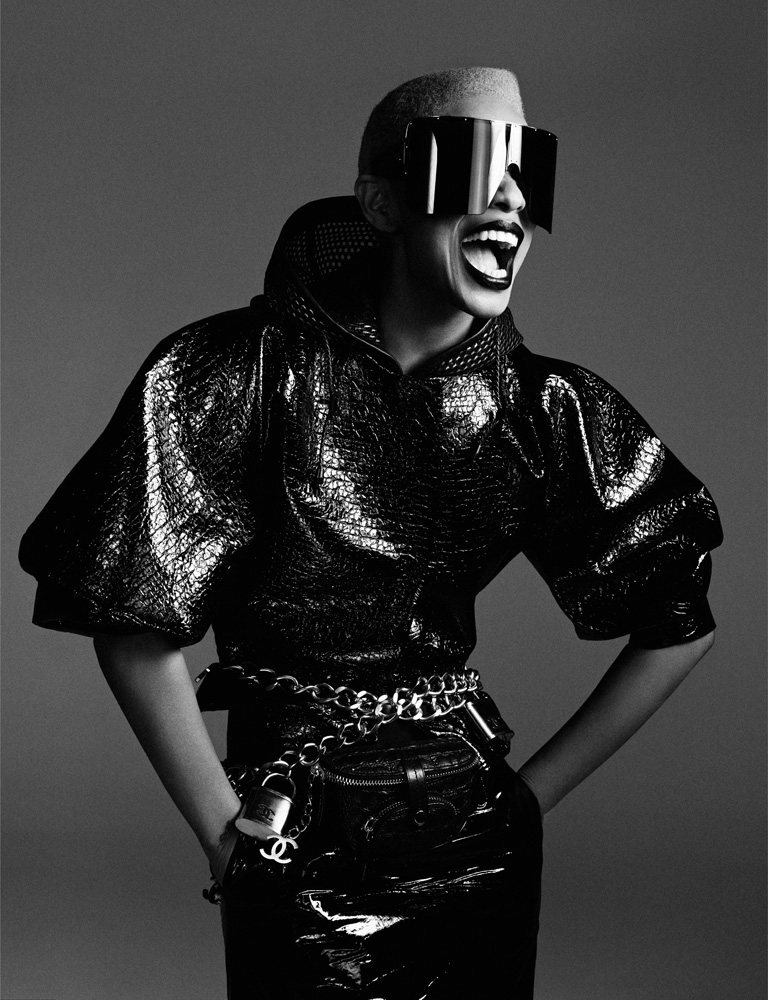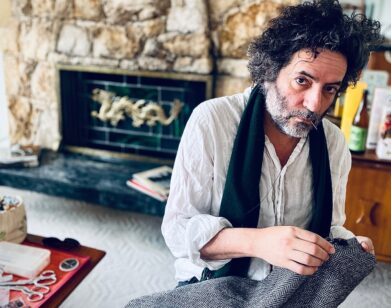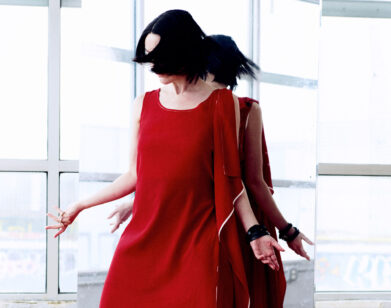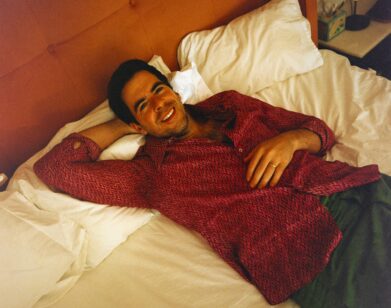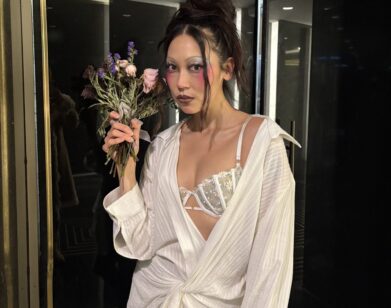Sharaya J
I’m so out of the box. I cringe when I think about a box. SHARAYA J
Among the thousands of terms and quotable lines that entered popular consciousness thanks to the seminal 1990s documentary Paris Is Burning is that of banjee girl. When the MC at the film’s titular vogue ball decrees that someone is giving him “a banjee-girl effect,” it’s a term of endearment, a declaration that the queen in question is giving you some girl-from-down-the-block realness. In the world of Sharaya J—the Hawaii- and New Jersey-raised rapper, choreographer, blue-haired fashion sensation—the term BANJI has taken on an altogether higher meaning. BANJI—an acronym for Be Authentic Never Jeopardize Individuality—is both a mantra and a design for life for the 30-year-old performer, born Sharaya Howell, who has not only turned the phrase into a song (featuring a video that puts the past three decades of street style through a blender and ends with Sharaya J rapping with her face entirely covered in jewels) but her own personal brand as well.
Even though she first came to fame as a dancer and choreographer—having worked with everyone from Diddy and Rihanna to Alicia Keys—Sharaya J is now poised to explode as an outside-the-box pop phenomenon. Singles like “Smash Up Da Place” show off her prowess as a dexterous rapper and uncanny knack for turning hip-hop conventions inside out. Having signed a deal with her friend and mentor Missy Elliott (under Elliott’s own Goldmind Inc. label), Sharaya is currently hard at work on her full-length debut. She took a few minutes before a recent NYC performance to call up style impresario Patricia Field to chat about her music, her upbringing, and her kaleidoscopic worldview.
PATRICIA FIELD: You’re doing a show tonight?
SHARAYA J: Tonight at Marquee.
FIELD: I want to come so much, but you know I’m such an old, worn-out dog. What time’s your show?
SHARAYA J: I think it’s at 12 sharp.
FIELD: At 12 sharp. All right, let me try …
SHARAYA J: I would love it if I could see you there! So how you doing?
FIELD: I’m honestly doing okay, but I’m so busy. Things come and it’s like, “All right, take it.” If you have the chance to take it, take it. I haven’t been out much because by the time I finish working, all I can do is sleep until I get back up and work again. But it’s just a phase.
SHARAYA J: Yeah. I haven’t quite wrapped my brain around the sleeping part yet, but I’m definitely working like a maniac.
FIELD: You don’t have to worry about the sleeping, honey. You’ve got years for that.
SHARAYA J: [laughs] I know.
FIELD: So, anyway, there are a couple of things that I would like to talk to you about. The obvious place to start is your background. I know that you grew up with music around you, from your family, so you had a jump on it and you continued with it. Looking back, how do you think your experience helped you start your journey to become who you are today?
SHARAYA J: Well, I grew up bicoastal, Hawaii and Jersey. My mom was a music-head. She said she would sit in front of the record player and just play all her father’s old records. She loved music. So growing up, she definitely was a musical influence, because I was listening to stuff like Sam Cooke, Aretha Franklin, Deniece Williams … She would play that stuff Sunday mornings. And so, from an early age, I knew a lot of records that weren’t from my time.
FIELD: You learned history from your mom. I had a similar experience with my aunts. When I was a kid, they were, I don’t know, 18, 20, and they used to drag me around to Times Square for a Frank Sinatra live show before a movie, to Billy Eckstine …
SHARAYA J: Ah, nice. My father was an influence too. When I was young, he was in a ’90s hip-hop group called Double XX Posse. I remember him locking himself in the bathroom for hours and just writing rap after rap after rap. And I remember being around in the studio. So I was kind of getting it from both ends.
FIELD: It’s like a 3-year-old kid-they get on an iPad and they start touching it, and little by little, they figure out what they’re doing. And then they’re better than anybody else because they started out with it.
SHARAYA J: You’re right.
FIELD: I see you, on many levels, as very professional—the way you’ve developed your talent. and part of being professional is being unique, which takes me to your BANJI definition of authenticity.
SHARAYA J: Yes, ma’am. I’m trying to take the BANJI movement and really make it a part of my brand. The acronym is Be Authentic Never Jeopardize Individuality. I actually live by those words and I could never conform to anything that’s not authentic to myself.
FIELD: You’re preaching to the choir. I always get asked something like, “What piece of clothing should every girl have in her closet?” I’m like, “Every girl is different! They do not have the same formula or the same closet. They have to know what goes in their closet, not my closet.”
SHARAYA J: That’s a cute way to say it. I like that.
FIELD: I think individuality is one of the most rewarding things that a person has. It is something that is part of your whole persona, which makes you stand out. You’ve learned the dance, you’ve learned the rap, you’ve got the music … It’s part of your fiber, like when you start weaving a cloth.
SHARAYA J: Right. Plus, Missy’s been kicking my butt.
I never went to school for dance. I just did a thousand talent shows, pageants, every kind of runway fashion show. Dance, I connected to immediately, right after music . . . I would run around the house making up routines. SHARAYA J
FIELD: I think that Missy loves her relationship with you because there are so many parallel lines between you and her.
SHARAYA J: Yeah. We see things about each other in each other. [laughs] You know what I mean?
FIELD: I believe that.
SHARAYA J: Creatively, that was her whole thing. She was really open with me. She was like, “Sharaya, what do you want to do?” And the BANJI movement, that whole thing started because of a group of executives who told me, “Hey, we think you have star quality. We love your stuff. Only thing is, you gotta get a weave, put heels on, and get out here and be like everyone else.” And I was like, “No way!”
FIELD: Thank God you said, “No way,” because out of a thousand people, 999 would say, “Okay.”
SHARAYA J: Right. [laughs]
FIELD: People say about people like you—and me too—”Oh, they’re so brave.” But I never thought of being brave as part of the act; I just thought of having my own center of what I want and going for it and not worrying about everything around me, because everything around me just confuses me. They try to confuse you and make you join the cult of the record company. They want to put you in their box.
SHARAYA J: Right. And you know me, I’m so out of the box. I cringe when I think about a box.
FIELD: I can’t even think about a box. I don’t want to go anywhere that’s dark. [both laugh]
SHARAYA J: Right. Or else I’m blind.
FIELD: I think that Missy gets that kick out of you that I totally get. It inspires her, it excites her, because she sees the individuality, and she is so definitely that.
SHARAYA J: She is that, yeah.
FIELD: And I also like the way you present yourself—your clothes and your fashion and your style. You can go many different ways, but all the ways are well-thought-out, coordinated. You can see there’s a design in your mind; it didn’t just happen. You can go from glamour, exotic glamour, to whatever street style …
SHARAYA J: BANJI girl on the street … Sweat pants, sneakers. [laughs]
FIELD: But you do it to a point of perfection. I see all the details. You’ve got this well-rounded music, fashion, and, of course I don’t have to say, the physical prowess of your dancing … Where did the dancing come from in your background? Because you didn’t just learn those steps, hon.
SHARAYA J: Right, but I never went to school for dance. I just did a thousand talent shows, pageants, every kind of runway fashion show … Dance, I connected to immediately, right after music. When I was really young, my mom said I would run around the house making up routines.
FIELD: Did your parents dance?
SHARAYA J: No. My mother always says, “Girl, who you get it from? Because I can’t hold a two-step.” And my father doesn’t really dance. It was just out of nowhere.
FIELD: That’s funny. That’s a parallel with me and fashion. In my family, I learned a lot from them, but not about fashion. I just kind of picked it up.
SHARAYA J: Right. It was probably inherent.
FIELD: It must have to do with picking up something broader first, and then later, picking up the mechanics of it.
SHARAYA J: Yeah, that’s the process. That’s how it starts.
FIELD: Because you didn’t learn dancing from some choreographer just teaching you a few steps …
SHARAYA J: I did get better. Actually, I always have to give credit to Laurieann Gibson. She really helped make me become the dancer that I am. But Missy’s like that too, because she loves dance so much. When I think of any choreography for any of my stuff, I’ll go in and make up a whole routine, and then she’ll come in the room, watch it three times, and then she’ll be like, “Okay, make up another one.” [laughs] And I’m like, “From the beginning?” She pushes me like that.
FIELD: So I wanted to touch upon the fact that you have a little bit of an actor’s quality. One minute you’re talking Jamaican-style, the next minute you’re talking like an Upper East Side lady or BANJI street style. They all work, so I think maybe when you’re ready to invest time in an acting career …
SHARAYA J: You know, I love film. I’m a movie buff. So it really does pique my interest. For me, it all kinda bleeds together. The music, dance, the film, the cinematic effect … and then I love comedy. And so I’d like to put it all together and then make something.
FIELD: I can see that you like comedy because you have that comedic edge to your presentation. It’s a sort of lightheartedness that you put into a dance step or an expression or a lyric or a facial expression …
SHARAYA J: Because it’s fun! It’s supposed to be fun. That’s what I miss, just about music in general and just what we do as artists—it should always be fun.
FIELD: Of course. Your work, your career, your creativity—it’s all part of your life. It all needs to be fun. I’m a believer in fun. I’m a believer in dancing. I miss that dancing part.
SHARAYA J: Right? That’s what going out is about!
FIELD: Everybody just stands around.
SHARAYA J: It’s so boring.
FIELD: I loved the days of the clubs like Studio 54 and into the ’80s … You walk into a place and you immediately start dancing. You don’t stand around. “Oh, let’s order a cocktail … blah, blah, blah.” It’s like, boom—dancing.
Missy’s been kicking my butt . . . We see things about each other in each other . . . She was like, ‘Sharaya, what do you want to do?’SHARAYA J
SHARAYA J: [laughs] Right. You couldn’t even hold a cocktail because you’d be moving so much—you gotta make sure your joint’s not spilling on the floor.
FIELD: I’m with you. So that makes sense when you say that acting is the cousin of music is the cousin of dance. It’s all part of the family. Well, I’ll be thinking of you in your next career adjunct as an actress. You certainly have the glamour and style for it.
SHARAYA J: Aw, I appreciate that.
FIELD: I see that you’ve worked with several really cool people—Beyoncé, Diddy, Ciara—but the Missy thing, I think, was more custom made.
SHARAYA J: I never worked for Missy as a dancer. Those other gigs were more like dance gigs.
FIELD: You worked as a dancer for them?
SHARAYA J: Yeah. I did some choreography for a couple of those gigs. Those were more geared toward my dance career.
FIELD: But didn’t you learn so many things?
SHARAYA J: Oh, so much. Interacting with those kind of people, just people who know the business, you learn a ton of stuff.
FIELD: You can’t help it.
SHARAYA J: Me and Missy ran into each other through one of those gigs because she loves dance so much. But I actually never worked for her as a dancer; I signed to her as an artist on the music side. As far as the new stuff I’m doing with her, I’ve got some really good stuff lined up. We’ve been in the studio crazy hours down in Atlanta.
FIELD: Missy has a place in Atlanta?
SHARAYA J: Yeah, because that’s her process—she feels like we need to be isolated so we can focus completely on the work and the creativity. She has, like, a method to her madness, but it works.
FIELD: She wanted to put you in a place with no distractions. All right, babe, I’m gonna make sure that I don’t burn myself out so I can get to the Marquee tonight.
SHARAYA J: Please! I would love to see you.
FIELD: All right, give Missy a huggy hug, and I’ll see you tonight.
PATRICIA FIELD IS A STYLIST, DESIGNER, AND ACADEMY AWARD-NOMINATED AND EMMY AWARD-WINNING COSTUME DESIGNER.
Too see the 10 things Sharaya J just can’t live without, click here.

